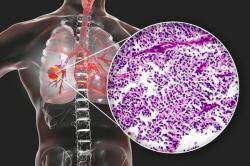- About
- Advertise / Support
- Contact
- CancerNetwork.com
- TargetedOnc.com
- OncLive.com
- OncNursingNews.com
- Terms & Conditions
- Privacy
- Do Not Sell My Information
© 2024 MJH Life Sciences™ and CURE - Oncology & Cancer News for Patients & Caregivers. All rights reserved.
Oncolytic Virus to Be Studied in Advanced Lung Cancer

Brielle Benyon, Assistant Managing Editor for CURE®, has been with MJH Life Sciences since 2016. She has served as an editor on both CURE and its sister publication, Oncology Nursing News. Brielle is a graduate from The College of New Jersey. Outside of work, she enjoys spending time with family and friends, CrossFit and wishing she had the grace and confidence of her toddler-aged daughter.
The oncolytic virus, MEM-288 will be studied in combination with Opdivo for patients with non-small cell lung cancer that progressed on standard therapy.
The next phase of a clinical trial will examine a novel oncolytic virus called MEM-288 in combination with the immunotherapy agent, Opdivo (nivolumab), for the treatment of adults with non-small cell lung cancer (NSCLC) that progressed on standard therapy, according to a press release from Moffitt Cancer Center, one of the institutions spearheading the trial.
This second phase of the phase 1 trial is coming after the completion of a phase 1a trial that showed that single-agent MEM-288 has the potential to treat solid cancers. Findings, which were published in May 2023 in the Journal of Clinical Oncology, showed that there were no dose-limiting toxicities. Additionally, among patients who responded to MEM-288, 40% experienced tumor shrinkage, including 30% who had a partial response and 10% who experienced stable disease.
“Preliminary safety, antitumor and immune response data are encouraging,” the researchers wrote in their 2023 findings.
Continued Study of MEM-288
Now, researchers plan to further test MEM-288 in combination with Opdivo for relapsed or refractory advanced NSCLC that progressed on a frontline checkpoint inhibitor. According to the trial’s listing on ClinicalTrials.gov, the drug combination will be administered either with or without concurrent chemotherapy.
“Combining MEM-288 with [Opdivo] represents a highly promising and innovative therapy in our fight against lung cancer,” Dr. Andreas Saltos, medical oncologist in the Department of Thoracic Oncology at Moffitt Cancer Center, said in the press release. Of note, Saltos will be leading the trial.
The main goal of the NSCLC portion of the study is to determine the overall response rate (ORR) in patients treated with MEM-288 plus Opdivo. ORR is the percentage of patients whose disease shrinks or disappears after treatment.
Researchers on the trial will also study the safety/tolerability of MEM-288, disease control rate, progression-free survival (time from treatment until death or disease worsening) duration of response and anti-tumor immune responses.
To be eligible for the trial, patients must have an ECOG performance status of 0 or 1, indicating that they can complete all or most of their daily tasks independently. They also cannot have undergone more than one treatment for advanced or metastatic disease. If patients have an EGFR or ALK rearrangement, they must have been previously treated with an applicable tyrosine kinase inhibitor.
How Oncolytic Viruses Work
According to the National Cancer Institute, oncolytic viruses work by infecting cancer cells and then blocking the protein that suppresses the immune system. In doing so, immune T cells can then find and attack the cancer. MEM-288 is injected directly into the tumor. It has two key proteins, according to the release: interferon-beta, which can trigger the immune system, and a version of CD40 called MEM40, which can also spark an immune response against the tumor or induce tumor-killing activity itself, according to research published by the National Institutes of Health.
“MEM-288 is designed to provide both antitumor activity as a standalone monotherapy and in combination with immune checkpoint inhibitor(s) to enhance the efficacy of immune checkpoint inhibition in solid tumors,” the ClinicalTrials.gov listing explained.
“We are hopeful that this trial will lead to more effective and enduring treatment options for patients who currently have few,” Saltos said.
For more news on cancer updates, research and education, don’t forget to subscribe to CURE®’s newsletters here.
Related Content:



